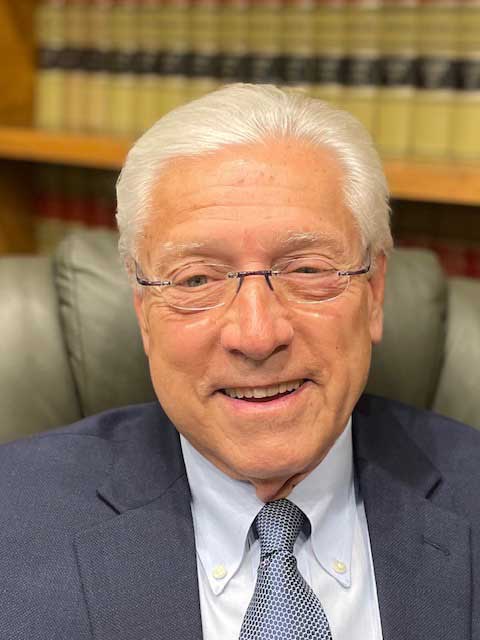Who we are
Kenneth R. Mikos is a Martindale-Hubbell A.V. preferred-rated attorney who has practiced law in South Florida since being admitted to the Florida Bar in 1969. He initially worked as an assistant Broward County solicitor prosecuting misdemeanor and noncapital felony cases. He successfully litigated some 136 jury trials during his tenure and over 750 misdemeanor and felony bench trials. After some two years working for the state prosecuting cases, he entered private practice in Broward County as a criminal and civil trial lawyer. In the early 1980s, he began devoting his practice exclusively to probate, estate, trust, and guardianship litigation, as well as probate and trust administration, and has practiced in those areas of the law almost exclusively for the past 44 years.

EXPERIENCE
Kenneth R. Mikos is a Martindale-Hubbell A.V. preferred-rated attorney who has practiced law in South Florida since being admitted to the Florida Bar in 1969. He initially worked as an assistant Broward County solicitor prosecuting misdemeanor and noncapital felony cases. Mr. Mikos successfully litigated some 136 jury trials during his tenure and over 750 misdemeanor and felony bench trials. After some two years working for the state prosecuting cases, he entered private practice in Broward County as a criminal and civil trial lawyer. In the mid-1980s, he began devoting his practice exclusively to probate, estate, trust, and guardianship litigation, as well as probate administration and has practiced in those areas of the law almost exclusively for the past 38 years.
INHERITANCE LITIGATION
Chapters 732 and 733 of the Florida Statutes provide guidelines for what happens when a Florida resident passes.
Intestacy is the condition of the estate of a person who dies without having in force a valid will or other binding declaration. Alternatively, this may also apply where a will or declaration has been made, but only applies to part of the estate; the remaining estate forms the “intestate estate”. Intestacy law, also referred to as the law of descent and distribution, refers to the body of law (statutory and case law) that determines who is entitled to the property from the estate under the rules of inheritance.

CIVIL LITIGATION
Civil law is the term that refers to non-criminal law. The law relating to civil wrongs and quasi-contracts is part of the civil law, as is law of property (other than property-related crimes, such as theft or vandalism). Civil law may, like criminal law, be divided into substantive law and procedural law. The rights and duties of persons (natural persons and legal persons) amongst themselves is the primary concern of civil law.
Dear Ken,
This is to tell you how much I have appreciated your services and those of your staff.
You quickly assessed the situation, repeatedly took the initiative, persisted in obtaining responses from the others, and you gave strategic direction towards mediation, all of which resolved in a dozen weeks a dispute that had lingered for more than two years.
Your ability to anticipate the Broward Court’s reaction, and to translate the hearings into formal decisions, was remarkable.
So, once again, well done, and thank you so much!
Inheritance Litigation
Inheritance litigation refers to legal proceedings taken to resolve disputes arising from the distribution of a deceased person’s estate. This can involve a variety of issues.
- Challenging the validity of a will: This might involve contesting whether the will was properly signed and witnessed, whether the deceased had the mental capacity to make a will when it was signed, or whether the will was the product of undue influence or fraud.
- Intestacy: If the deceased died without a will, their estate will be distributed according to state law, which may not coincide with the wishes of certain family members. This can lead to disputes about who inherits what and how much.
- Breach of fiduciary duty: An executor or administrator of the estate may be accused of mismanaging the assets or acting in their interests instead of the beneficiaries’ interests.
- Breach of trust: If the deceased’s estate includes trusts, there may be disputes about how the trust assets are managed or distributed.
- Other disputes might involve claims for pre-mortem inheritance gifts, disputes over family heirlooms, or allegations that someone has interfered with a potential inheritance.
The process of inheritance litigation can be complex and time-consuming. Our staff will take care of all the necessary steps to acquire the desired result, including:
- Mediation or negotiation: Often, parties will attempt to resolve the dispute outside of court through mediation or negotiation.
- Discovery: This is the process of gathering evidence, which may include interviewing witnesses, obtaining documents, and taking depositions.
- Trial: If the dispute cannot be resolved outside of court, it will go to trial.
- Appeals: The losing party may file an appeal to challenge the trial court’s decision.
It is essential to consult with an experienced attorney, such as Ken Mikos, if you are considering filing an inheritance lawsuit. We will advise you on the merits of your case, the potential costs and risks involved, and the best course of action to take.
Probate Administration
Probate administration is the court-supervised process of handling a deceased person’s estate after death. It involves several key steps to ensure the estate’s debts are paid and assets are distributed according to the decedent’s wishes (if they had a will) or state law (if they didn’t).
- Assets and Inventory: The first step involves identifying and valuing all the assets the deceased owned solely (or with no right of survivorship). This includes real estate, bank accounts, vehicles, and belongings.
- Appointing a Representative: The court appoints a personal representative (executor if there’s a will) to manage the estate. This person is responsible for paying bills, filing tax returns, and distributing assets.
- Probate Process: There are typically two main types of probate administration:
- Formal Administration: This is a more complex process required for larger estates or when a will needs to be validated. It involves court filings, notifying creditors, and potentially resolving any disputes.
- Summary Administration: This is a faster and simpler process for smaller estates that meet specific criteria (e.g., value threshold).
- Debt Payment: The estate’s debts are paid using estate assets before any distributions to beneficiaries. Creditors have a window to file claims against the estate.
- Distributing Assets: Once debts are settled, the remaining assets are distributed to the beneficiaries named in the will (if there is one) or according to state law (if there isn’t).
The probate process can be time-consuming and vary depending on the complexity of the estate and state laws. It’s often recommended that a probate attorney be involved to ensure everything is handled correctly and efficiently.
Guardianship and Trust Litigation
Guardianship and trust litigation are intertwined legal areas that deal with disputes arising from court-appointed guardianships and trusts. Here’s a breakdown of each:
Guardianship Litigation:
- Focus: This centers on legal disputes surrounding court-appointed guardianships for individuals deemed incapacitated. An incapacitated person, also called a ward, may be unable to make their own decisions due to age, illness, or disability.
- Common Issues: Disputes can arise when someone contests the need for a guardianship, the suitability of a particular guardian, or the guardian’s actions in managing the ward’s finances or care.
- Examples:
- An adult child may challenge the appointment of a sibling as guardian for their aging parent, believing they are not the most qualified choice.
- A ward might contest the guardian’s decisions about their medical care or financial management.
Trust Litigation:
- Focus: This deals with legal disputes involving trusts, which are legal arrangements where assets are held by a trustee for the benefit of beneficiaries.
- Common Issues: Examples of disputes include:
- Challenging the validity of a trust document if it’s believed to be forged or the grantor (person who created the trust) lacked mental capacity.
- Accusing the trustee of breaching their fiduciary duty by mismanaging the trust assets or failing to act in the best interests of the beneficiaries.
- Beneficiaries disagreeing about the interpretation of the trust terms or how assets should be distributed.
Connection Between the Two:
- Overlapping Issues: Sometimes, a guardianship and trust dispute can be intertwined. For instance, a guardian might also be named as a trustee in a trust created by the ward. If there are concerns about the guardian’s actions in managing the ward’s finances, it could extend to questions about their management of the trust assets as well.
- Beneficiaries’ Rights: In both guardianships and trusts, beneficiaries have rights to ensure the ward or trust assets are protected. Litigation may be necessary to enforce those rights.
General Points:
- Emotional Toll: These disputes can be emotionally charged, especially when family members are involved.
- Seeking Legal Help: If you’re facing a guardianship or trust dispute, consulting with an attorney specializing in probate and estate litigation is crucial. They can advise you on your rights and navigate the legal complexities.
Civil Litigation
Civil litigation refers to legal disputes between private parties brought before a court. Unlike criminal cases, in which the government charges someone with wrongdoing, civil litigation is about resolving disagreements and obtaining remedies such as financial compensation or specific actions from the other party.
A plaintiff initiates the lawsuit in a civil case, and a defendant responds. Plaintiffs can be individuals, businesses, or organizations.
Civil litigation covers various issues, including breach of contract, personal injury, property disputes, business torts (wrongful acts), family law matters, and intellectual property.
A civil lawsuit typically involves filing a complaint, discovery (exchanging information), potentially alternative dispute resolution (mediation or arbitration), and a trial where a judge or jury issues a verdict.
Civil litigation aims to get a court order that resolves the dispute. This could involve awarding money to the plaintiff, requiring the defendant to take a specific action (or stop taking a particular action), or issuing a declaratory judgment that clarifies the parties’ legal rights.
Not all civil cases go to trial. Many are settled out of court through negotiation or mediation.



